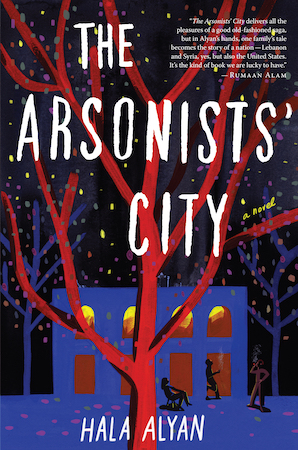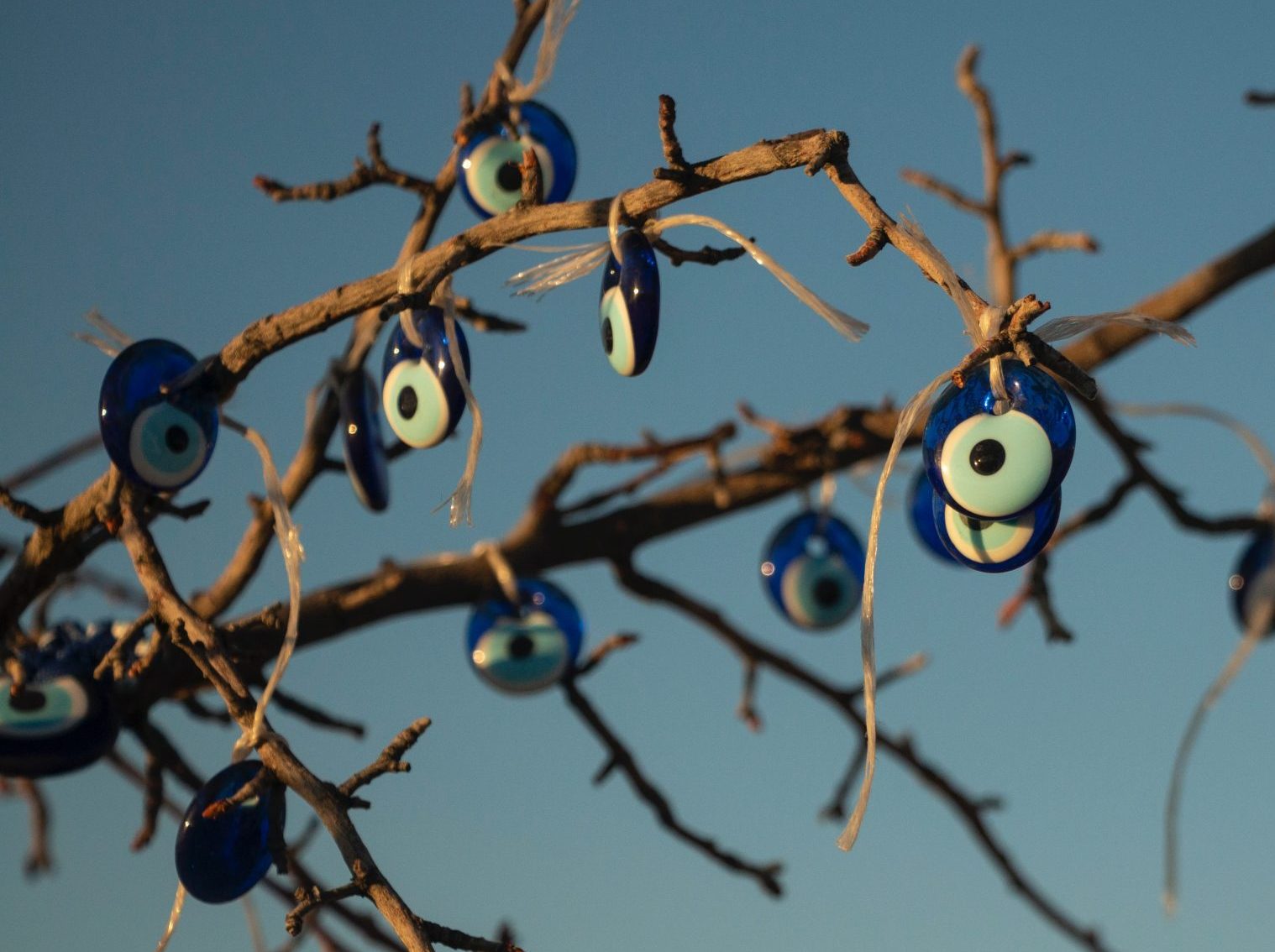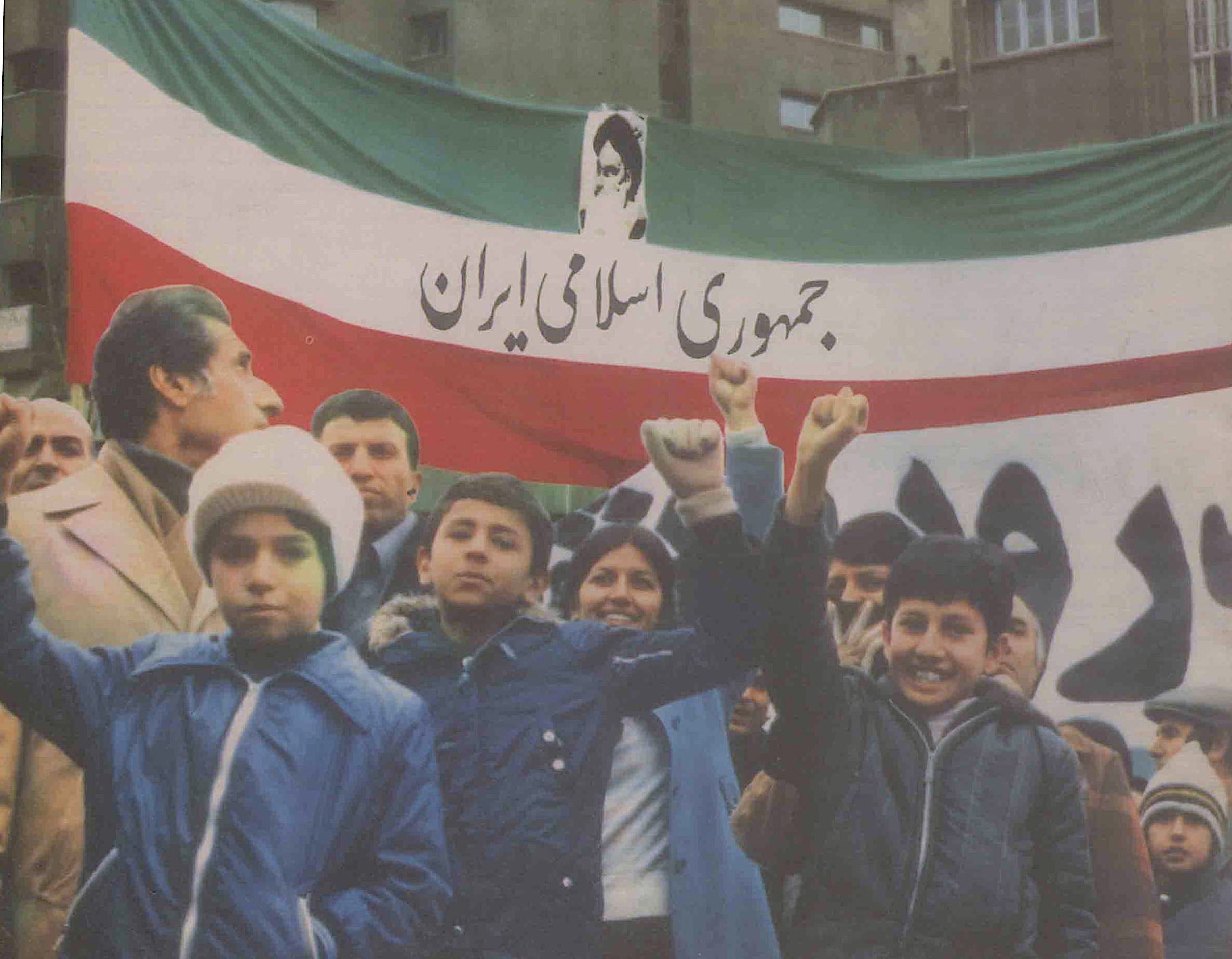interviews
War Is a Trauma That Follows Us from Home to Home
Hala Alyan on intergenerational trauma, the Palestinian diaspora, and the Lebanese revolution in “The Arsonist’s City”

“That house has become a mausoleum,” Idris Nasr tells his daughter, Ava, as he breaks the news that he is selling the family’s ancestral home in Beirut. In Ava’s mind, the house comes to life through memory: she feels the swampy summer heat and visualizes walls speckled with the blood of mosquitos. But Idris sees it differently. “The life has been taken out of it,” he says.
Home is a tenuous concept in Hala Alyan’s second novel, The Arsonist’s City, a sweeping family saga that examines the insidious long shadow of war. The Nasr family—made up of a Lebanese father, Syrian mother, and three American children—live in far-flung places: Austin, Brooklyn, Beirut, and Blythe, a small town in California. However distant they are from one another, and however far they might be from Beirut, they cannot escape the histories of violence that have left their family reckoning with intergenerational trauma. When they return to Beirut to mark the sale of their family home, long-held secrets and difficult memories begin to unravel, and political tensions in Lebanon escalate into thawra (revolution).
An award-winning Palestian American poet, clinical psychologist, and writer, Hala Alyan brings her talents to examine the ongoing crisis of Palestinian displacement in The Arsonist’s City through deeply imagined characters, place-based descriptions that teem with life, and attention to conflicts from past to present day. Over Zoom, we talked about how Alyan’s work as a clinical psychologist serves her fiction, the idea of home, the intimacy that secrets can offer, and the effects of intergenerational trauma.
Jacqueline Alnes: There is a line early in the novel, “They’d hurt that young man for no reason other than that people were hurting people.” One of the most poignant parts of this book for me is the ways you so deftly capture both the immediate impact of violence as well as the way that trauma radiates outward, oftentimes for generations. What draws you to write about all these different wounds?
Hala Alyan: The ways in which sociopolitical turmoil, occupation, and war trauma have spidered their way through my family’s history is something that I definitely keep gravitating back towards. It is a story that I feel the reverberations of on a daily basis, even as someone who is so privileged and so sheltered. I’m in Brooklyn now, I’m in a safe place, and my family is safe––thank God––but there are ways in which I see traumatic histories play out in myself, my family, and my community, in the anxieties that people have, in the ways that people are waiting for the other shoe to drop, in the ways that there is a deep mistrust of history, of certain institutions, of certain countries, of certain parts of the world. There’s a defeatedness in a lot of people I know around certain countries in my home region who wonder: Will those places ever be revived? Will they ever be actual options of places to live?
It’s also something I see a lot in clinical work. As a therapist, I work a lot with immigrants, children of immigrants, and folks that have been displaced. A generation later, you see how traumatic histories have trickled down to the folks that never lived in a war-torn zone or have never actually directly interacted with their parents’ house or their grandparents’ house. You see how that intergenerational trauma can touch even the most sheltered, comfortable, suburban kid. If a part of the world has been occupied or colonized, you never fully shed yourself from those shackles. You have the shadow of that for many generations.
JA: Having a safe place to live is a theme that resonates so powerfully throughout the book. Something that I kept thinking about is that homes are often viewed as concrete or permanent in some way, but in the book, some of them are the last vestiges of a wealth that no longer exists. Or, they’re structures that are beautiful and laden with generations of money, but they are located in precarious spaces.
HA: They aren’t safe. That’s something I think about a lot. You can have these ancestral homes that are gorgeous and so meaningful and such a part of your lineage, but if they are in a place where you can’t safely live or visit, then what are they but walls and plaster?
JA: When you mention working with people in the suburbs who still carry intergenerational trauma, I found it interesting that in the book we visit such a sprawl of places: Austin, Brooklyn, Beirut, and a small town in California, Blythe. How do you approach writing about place and home?
HA: I constantly lament the fact that there isn’t enough life for any of us to spend our youth in like ten different places. I am someone, for example, who always felt like I was supposed to live in Boston. I’m very attached to the idea, and I don’t know why. Same thing with Santa Fe and Tucson; I feel like I’m supposed to be in the Southwest. I’m someone who thinks a lot about factored timelines and the way that if you took this turn and you ended up in this place, you’d live an entirely different life. Not only would you have a different history, but your children would have a different history. Place colors the texture and the fabric of everyday life and zooming out also changes the entire trajectory of what happens to you: the opportunities you have, the people you fall in love with, where you go to school, etc.
This book feels to me like a love letter to Beirut.
JA: The novel alternates between present day and the 1960’s through the 1980’s. What drew you to those time periods?
If a part of the world has been occupied or colonized, you never fully shed yourself from those shackles. You have the shadow of that for many generations.
HA: I knew I wanted it to end in present day and I knew I wanted it to span the civil war, so in some ways, those became logistical markers; if I had a character coming of age as the civil war is happening, I would have to adjust the years accordingly. You see this in writers who write about things close to home, I’m fascinated with my parents’ generation. I’m interested in folks who moved to the States in the ‘70s and ‘80s. My parents didn’t move until ‘91, but people who moved during that era fascinate me. It was a time when there was still a high demand on assimilation. You got rid of your accent, taught your kid English; those were values that were being prioritized and communicated to immigrants and people seeking asylum. It’s interesting to really get inside the families that had that pressure. If they had moved to Chicago or New York City, it would have been a different story. But in a small town, the pressure to assimilate is higher.
JA: I felt like the present was a place in the novel where you could lean into queerness.
HA: Naj was one of the first characters I wrote and it was interesting to think about these different tension points of a queer character who is living very authentically to herself, but is in a position where telling her family doesn’t feel like it’s feasible. Playing with that tension also was important for me because there is this narrative––and it’s mostly a Western narrative–—that coming out is the graduation of queerness, that the end goal or destination of being queer is to come out, and I don’t think that’s something that resonates with people in different cultural backgrounds.
There are certainly people who are Muslim and Arab who want to ultimately come out, but imposing that narrative on people gets dicey. Writing a character who does live in this borderland space––and in a lot of ways is fulfilled in it––was really interesting.
JA: The book opens with Zakaria, who lives in the refugee camps outside of Beirut, and an epigraph from Svetlana Boym: “the main feature of exile is a double conscience…a constant bifurcation.” You have written about the Palestinian diaspora in your previous work. What aspects of this ongoing crisis did this book in particular allow you to explore?
HA: In some ways, Palestine is the shadow of the book; Palestine trails story. It’s in many ways the most central plot and one of the most central characters, but the book doesn’t center straightforwardly Palestinian characters or take place in Palestine. I was called upon to research these other countries and conflicts in the rest of the region. I have put a lot of attention on Palestine, and I always will, but writing this book enabled me to learn more about the Lebanese Civil War. I lived in Lebanon for a long time, I’ve taken all the classes, I read all the books, but there is still so much that is incredibly nuanced. The version of history you get depends upon the person who is telling it. Because it was a conflict so marked by sectarianism, many people, even now, will tell different stories of who started the civil war. It enabled me to research that more, to speak with people from different groups, and it also enabled me to think about that region as a gestalt.
These borders are arbitrary. The land kisses each other, these places are close to each other, and what happens in one happens in the others. What happens in Palestine spills over to Lebanon, spills over to Syria. What happens to Syria––I mean, we just saw this in the last decade. Their fates feel inexorably linked. This book allowed me to dig deeper into the history of the region as a whole and just to think more about this relationship between sister countries that have this reciprocal, sometimes mutually symbiotic, and at times a really divided dynamic. It let me dig into it in a way I hadn’t before.
JA: Why was it important to you to write this book now?
HA: When I finished writing this book, the revolution in Lebanon had not begun. The publication date got pushed back, which enabled me to go back and write things in. It was tricky. There was the inflation, the hunger, the poverty that people are experiencing, and I kept needing just one more paragraph; I felt an intense responsibility to capture what was happening in Lebanon. The publishers were very accommodating and generous, but they reminded me that at some point the story has to end; you’re not going to know what happens next.
JA: That’s so interesting. In fiction, I feel like there are varying degrees to which you have to be married to “truth,” however we want to define that. How much of an allegiance did you feel toward representing the world accurately in this book, even though it’s a novel?
There’s a defeatedness in a lot of people I know in my home region who wonder: Will those places ever be revived? Will they ever be actual options of places to live?
HA: I’ve got to be honest with you: I’ve never had any issues playing fast and loose with things in fiction. But, what happened in Lebanon post-thawra (revolution) starting, was such a different chapter. It set such a different tenor for the country, and set into motion so many unprecedented things, that I knew I had to allude to it. If I didn’t, it would have been really odd to anyone who knows anything about Lebanon.
Normally, I try to get the facts right so I speak with historians, and I do my research, but the past is much easier; the past is static. Writing about something that was dynamically shifting as I was doing edits was a whole different experience.
JA: They vary from being trivial to not, and some are only revealed when a body can no longer physically hold them. What intrigues you about this withholding of information, which, in itself, seems like a kind of an intimacy?
HA: I am fascinated with why we keep secrets and fascinated by how people decide what the truth is. I’m less interested in how people lie to other people than I am in how people lie to themselves. I am interested in how people decide what needs to be hidden and how it’s almost always tied to some narrative or some story they have about what will be accepted or loved. It’s very rarely tied in reality. It’s connected to their own story about what’s okay and what’s not okay. Writing that out is so gratifying to me.
I’m also, particularly with families, fascinated by the ways that the secrets we keep in families trickle down across generations. So the secrets that my great-grandmother might have kept, have impacted me. They have shot out backwards and forwards. They did something with the trust that my great-grandmother had with her mother and how that trickled down to my grandmother and mother. We learn how to hide things from the people we grow up with. We learn how open we are or how guarded we are from our families or caretakers. This idea that something that happened way before you were born can have a direct influence on you and how you move through the world –– what you share and what you don’t –– is such fertile territory to explore.
JA: I was going to ask if that’s why you love writing these rich, intergenerational stories.
You can have these ancestral homes that are so meaningful, but if they are in a place where you can’t safely live or visit, then what are they but walls and plaster?
HA: Totally. I think this is where psychology comes in. Something that happens to you is going to impact like three generations later. It just is. There is the epigenetic passing of trauma, but then also these subtle things that we pass down and inherit. This isn’t exclusive to people you’re genetically linked to; it’s also caretakers. We inherit things emotionally and psychologically from people. The fact that that is something I really believe means that the idea that something can go wrong at some point and then fast forward to see how something plays out means that it requires a family to really explore. You have to have several generations to see how a secret plays out so that’s why I think I end up writing these sweeping, long stories.
JA: I’m sure you are asked this often all the time, but you are a clinical psychologist who specialized in trauma and addiction work while earning your PhD. How does that inform your writing and the stories you’re drawn to?
HA: The training that you have to do in order to be a psychologist has been super useful to me as a writer. When you meet somebody for the first time as a therapist, you are taking a few fragmented, unconnected pieces of a story, and someone’s history, and over the few months or however long, you’re trying to help that person create a cohesive narrative. That’s very similar to writing a story: fiction, nonfiction, whatever. You have pieces of interests, hypotheses, interests of characters, and then you’re trying to create something that’s whole.
That kind of sleuthing feels very similar, as do the questions that you ask yourself when you’re doing therapy that have to do with client motivations: why do people do the things they do? People are constantly doing things that don’t make sense from the outside. Both you and I, in the span of the next two days, are going to do things that seem super irrational to people outside of us. There are such multifaceted, complex reasons for why people do things. To write good characters, you have to ask those questions about what moves somebody and what are a person’s desires and feelings and what they are moving toward.








